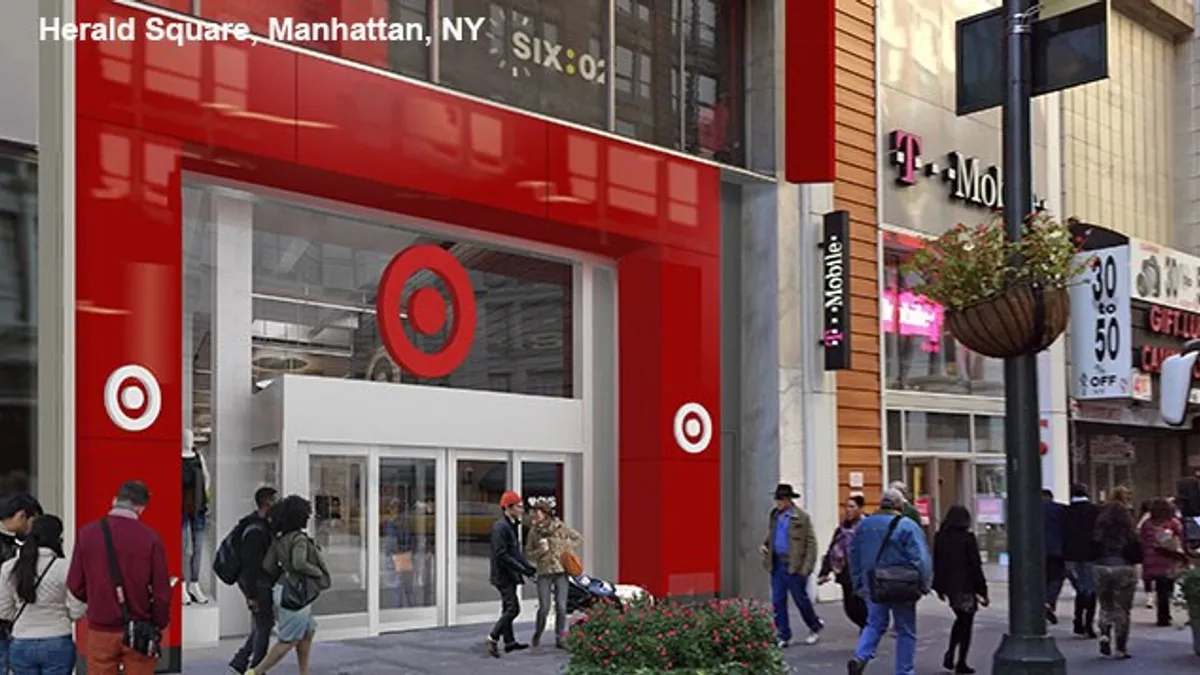Dive Brief:
- Target released new climate goals Wednesday that not only reduce its own carbon emissions targets but also require 80% of the retailer's suppliers set science-based reduction targets by 2023.
- The retailer committed to reducing emissions by 30% by 2030 (based on 2017 levels) — a goal approved by the Science-Based Target initiative (SBTi), according to the company's announcement.
- This marks the first time Target has taken its entire supply chain into account when calculating greenhouse gas emissions, a spokesperson told Supply Chain Dive in an email, adding the supply chain represents 96% of Target's total emissions.
Dive Insight:
The SBTi requires companies to set emissions goals "in line with the level of decarbonization required to keep global temperature increase below 2 degrees Celsius compared to pre-industrial temperatures," as described by the initiative.
Other major retailers with SBTi targets set include Walmart and CVS Health. Best Buy, Gap and One Jeanswear Group have committed but not yet set targets. Across all business categories, 545 companies so far have committed to setting science-based targets, and 193 have approved targets.
Target's goals cover energy used in or purchased for Target's owned facilities (deemed Scopes 1 and 2) along with energy used in manufacturing, distribution, corporate travel and even by Target guests (Scope 3). Target will require suppliers to address only Scopes 1 and 2 by 2023.
Major levers Target will pull to reach its goal internally include transitioning to wind and solar power and increasing energy efficiency of stores and improving energy and water efficiency in the manufacturing facilities the company owns.
Setting a clear goal for supplier emissions is a component of setting Scope 3 targets. Walmart is the only other comparable retailer to take this step. Walmart tracks supplier emission progress through its own sustainability effort Project Gigaton.
How difficult will the 80% standard for suppliers be to achieve? With Target's considerable power as a buyer in the marketplace, suppliers will likely fall in line, and several major players have already set targets.
Major CPG companies and likely Target suppliers with SBTi targets already set include Colgate Palmolive, Electrolux, L’Oréal, Panasonic Corporation, Procter & Gamble Company, Seventh Generation, Sony, General Mills, Kellogg, Mars, Nestlé, PepsiCo, Tyson Foods, Dell Technologies, Fujifilm, HP and Seiko Epson.
It also may be a blessing that Target has more direct control over its apparel product than most chains, selling a large number of private label brands since the list of apparelmakers with set targets is relatively short. It must be noted, however, that the number of consumer goods and apparel companies committed to the SCTi far exceeds the number with targets set. Since the initiative requires targets to be set within one year of commitment, the list of Target suppliers contributing to the 2023 goal will likely grow in the coming months.















